Knowledge sharing and individual performance: The case of Vietnam
The university, as a center for knowledge creation and cultural preservation, not only develops human
resources but also maintains, manages and develops new knowledge that meets the needs of society.
Knowledge is considered to be an invaluable asset, a major source of national development and
knowledge management (Anantatmula, 2007) and therefore inevitably becomes an issue that needs to
be addressed in order to achieve the goals of organizations, particularly knowledge creation centers like
universities. Many management processes in universities have considered knowledge management,
such as management of training activities, management of science-technology activities, personnel
management, training and updating new knowledge for lecturers, creation of e-governance system,
knowledge sharing among lecturers, etc. The knowledge gained by lecturers and researchers is regularly
published in scholarly journals, books but knowledge is often scattered without the necessary
association and interrelationships. This is the task of the knowledge management team to establish
links, correlations and knowledge management systematically. However, grasping the tacit knowledge
of not only the teachers and researchers, but also of other employees and students, poses a challenge to
the universities.
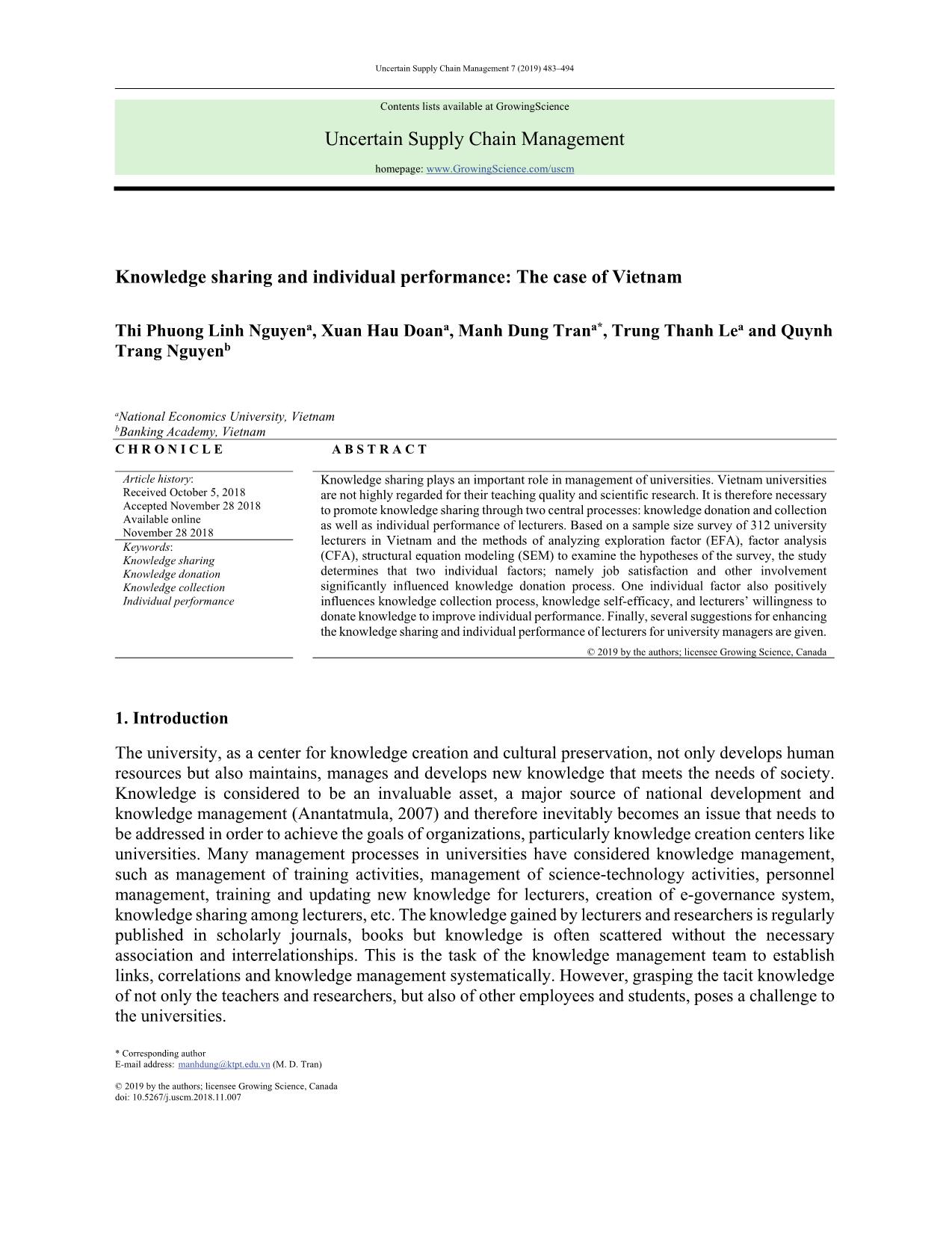
Trang 1
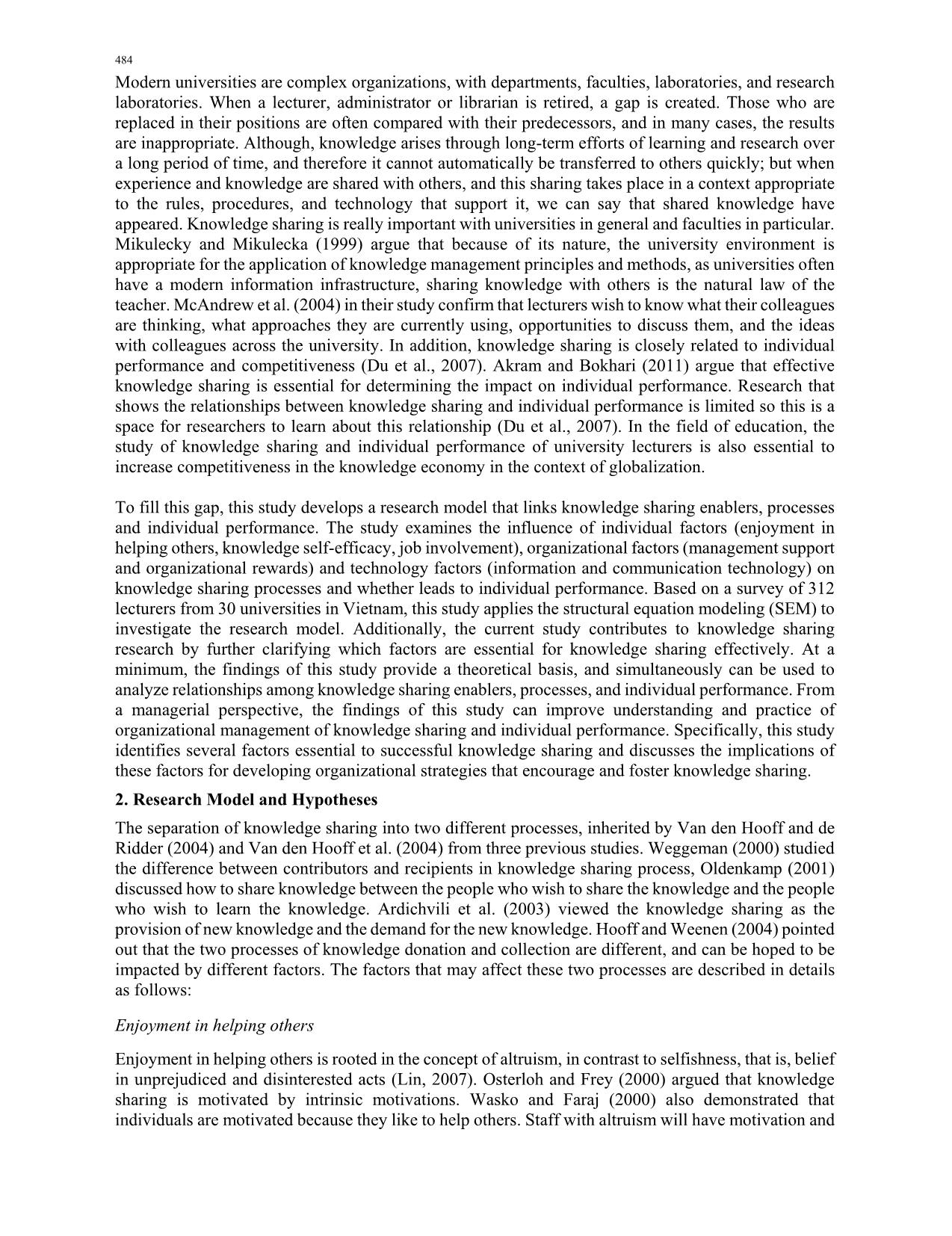
Trang 2
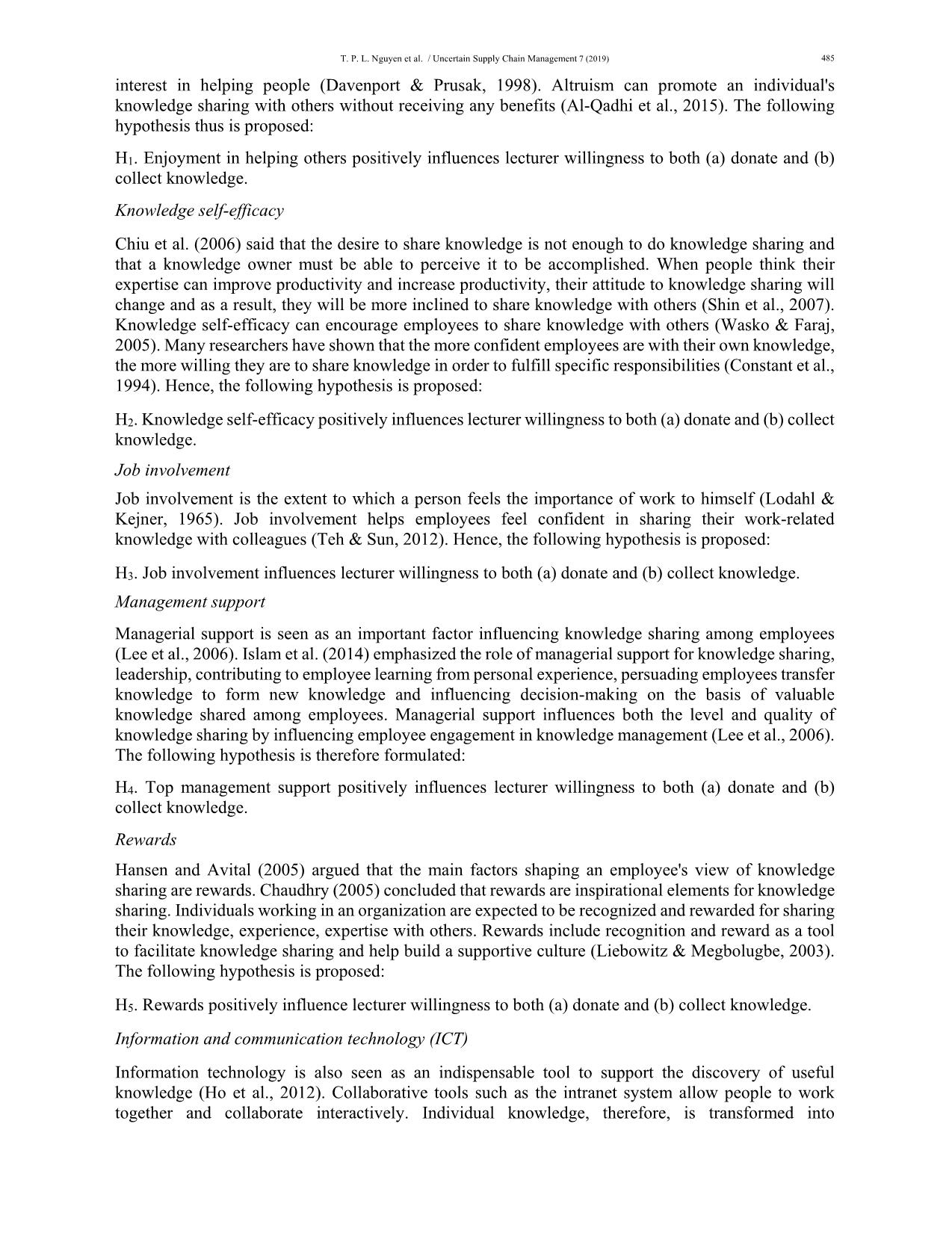
Trang 3
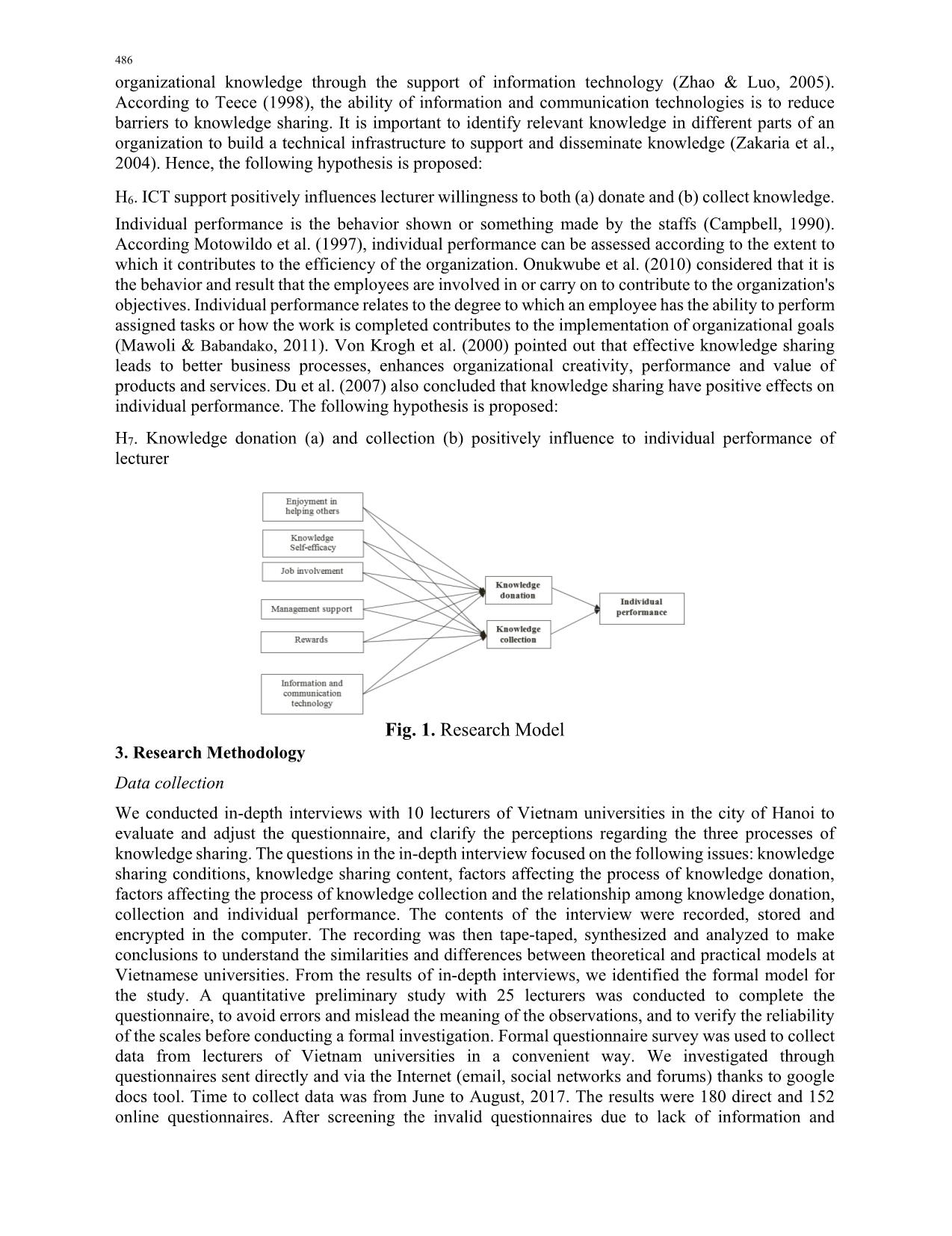
Trang 4
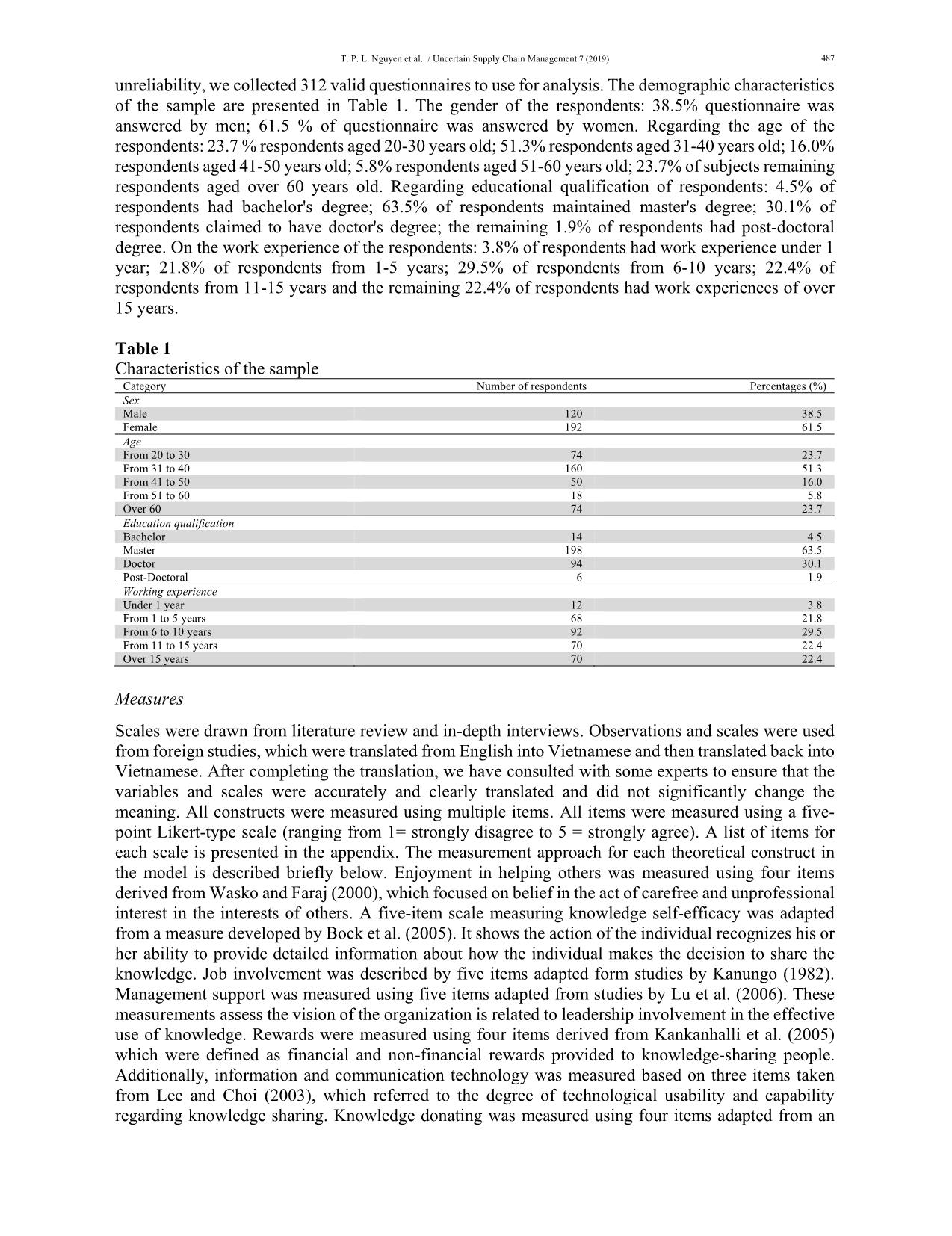
Trang 5
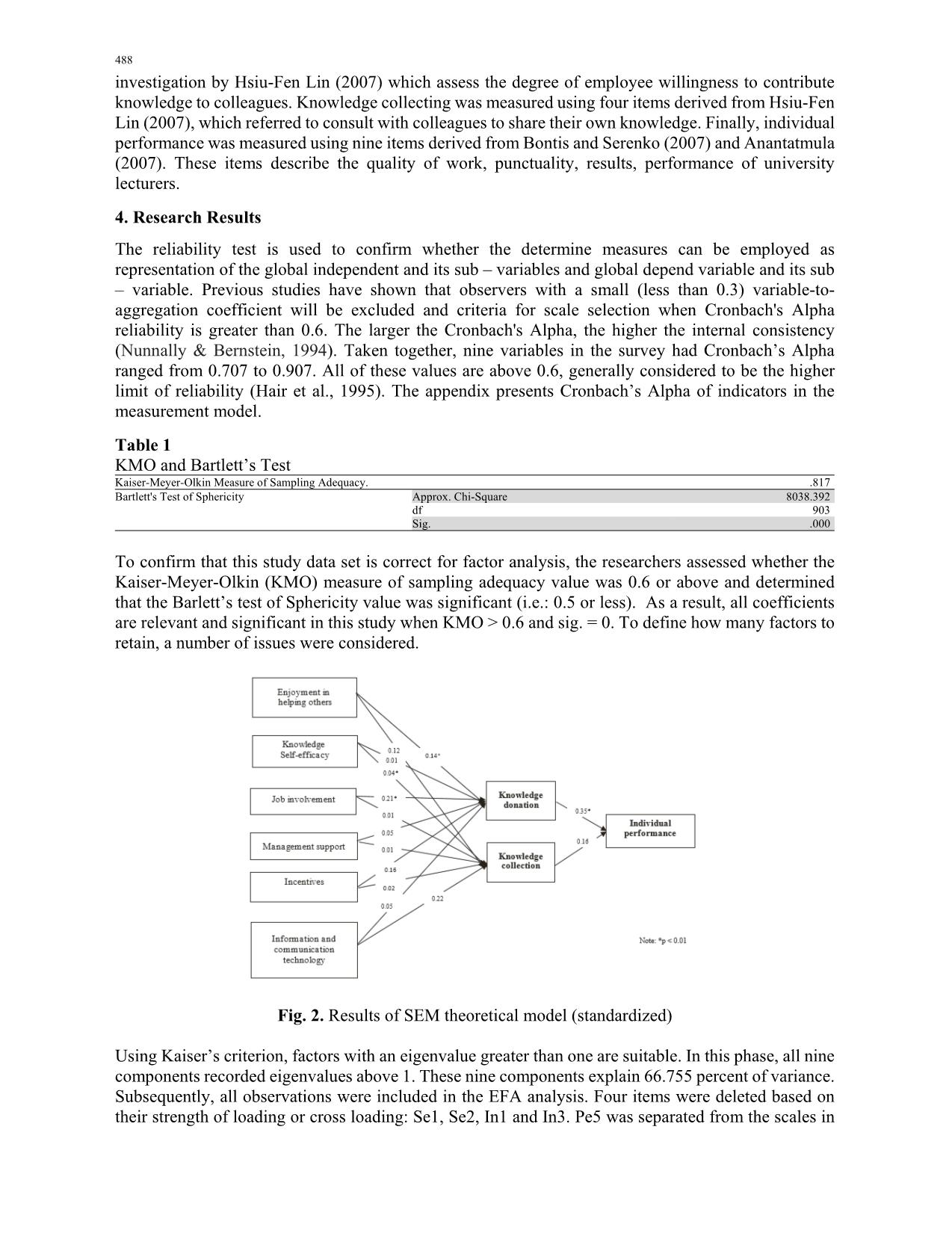
Trang 6
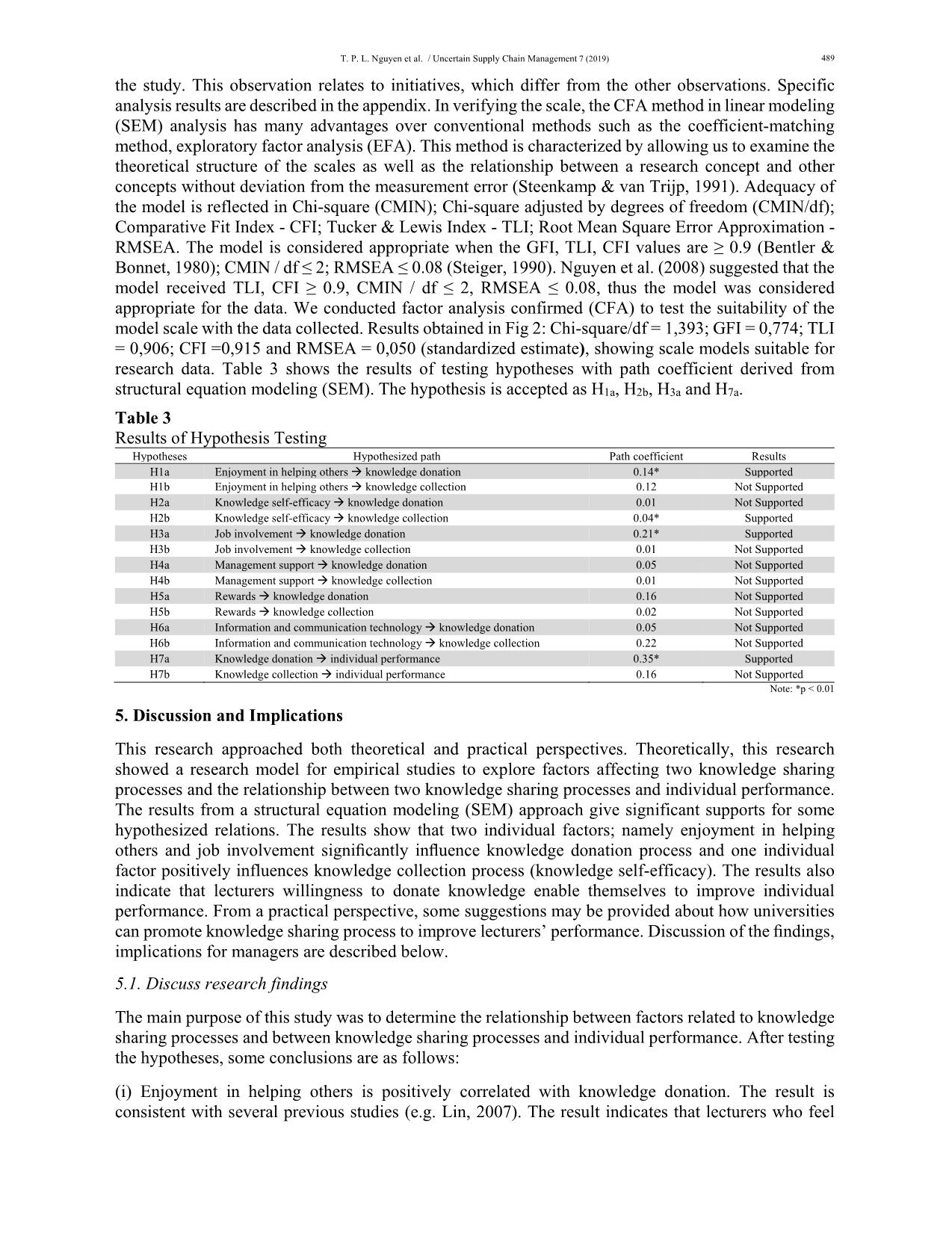
Trang 7
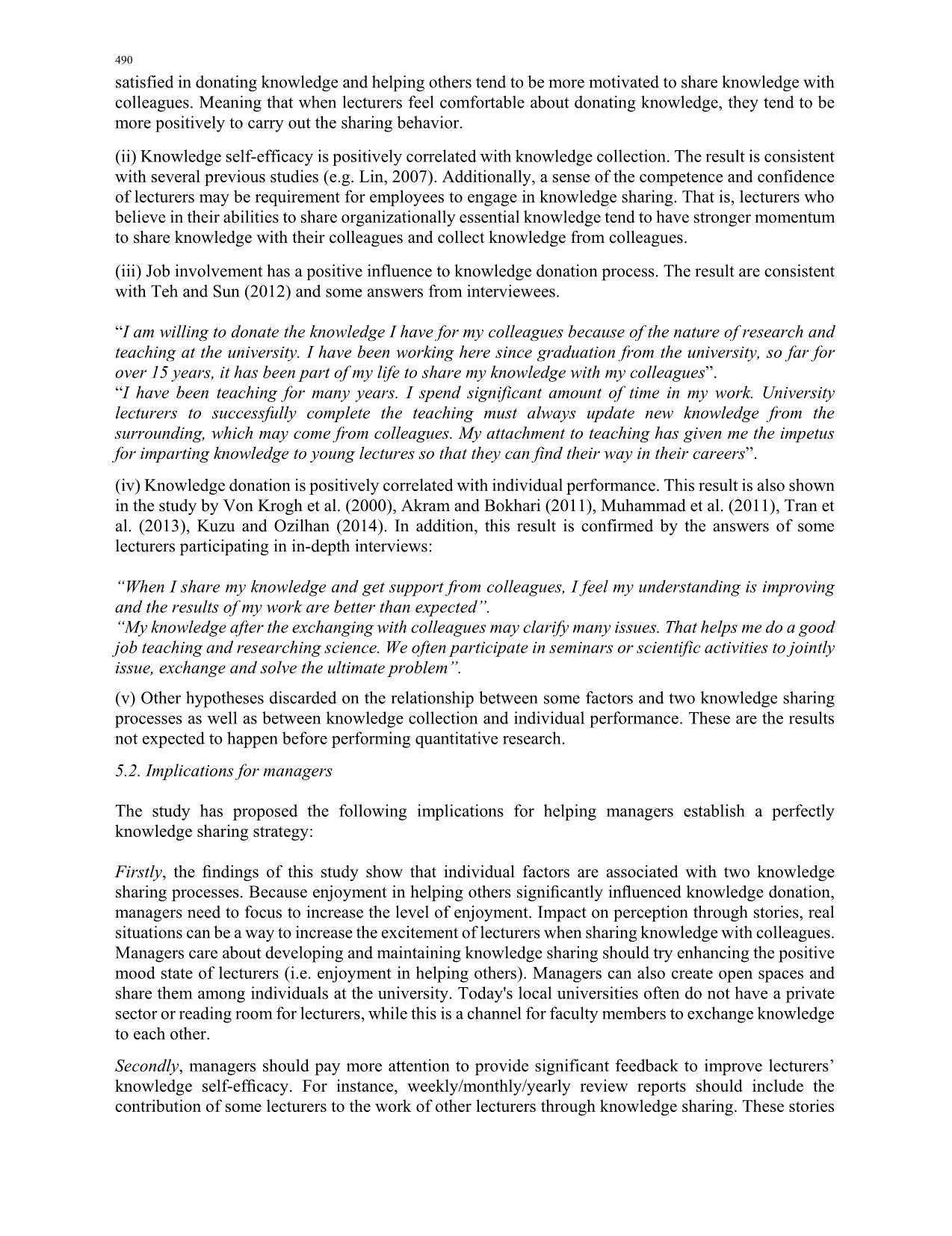
Trang 8
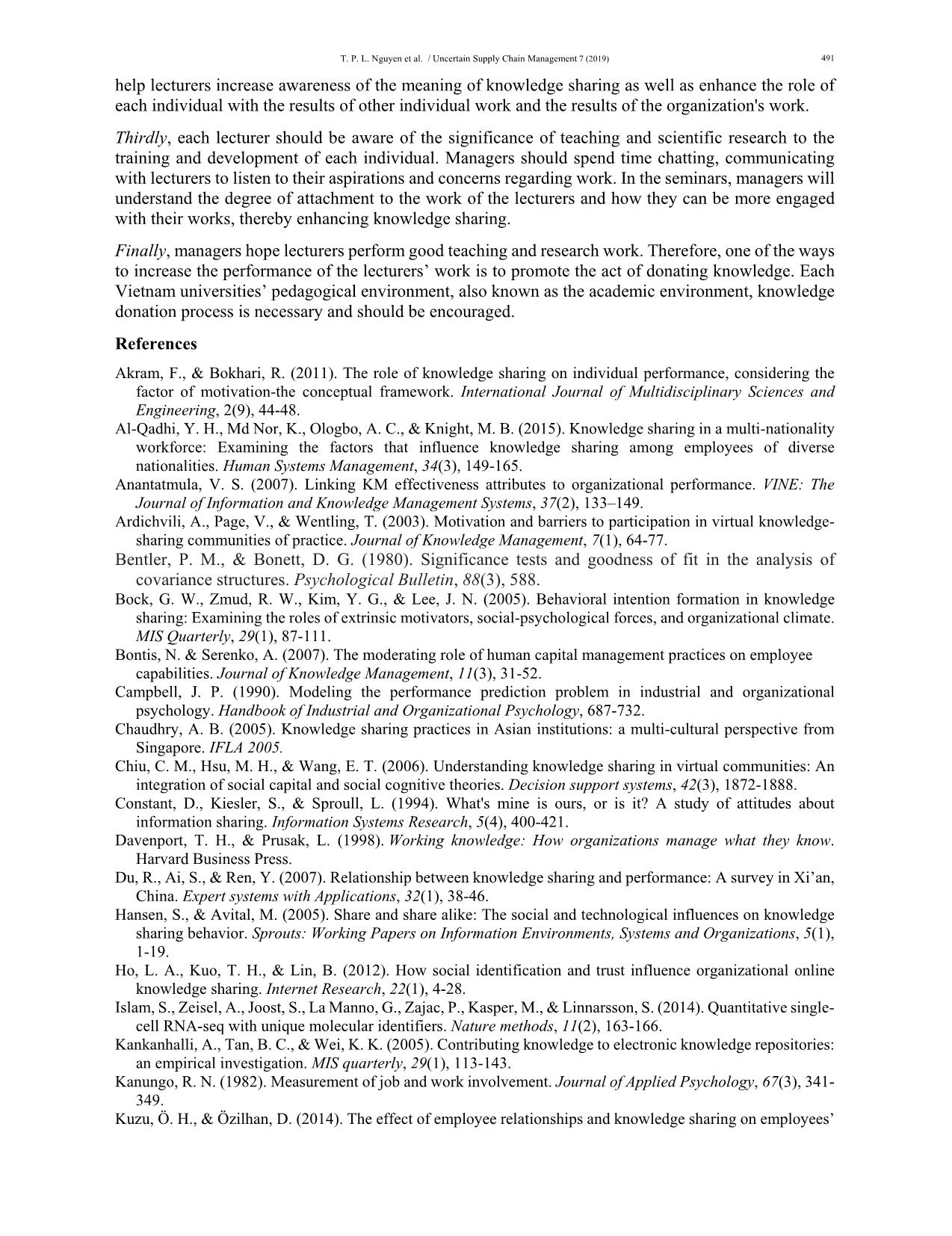
Trang 9
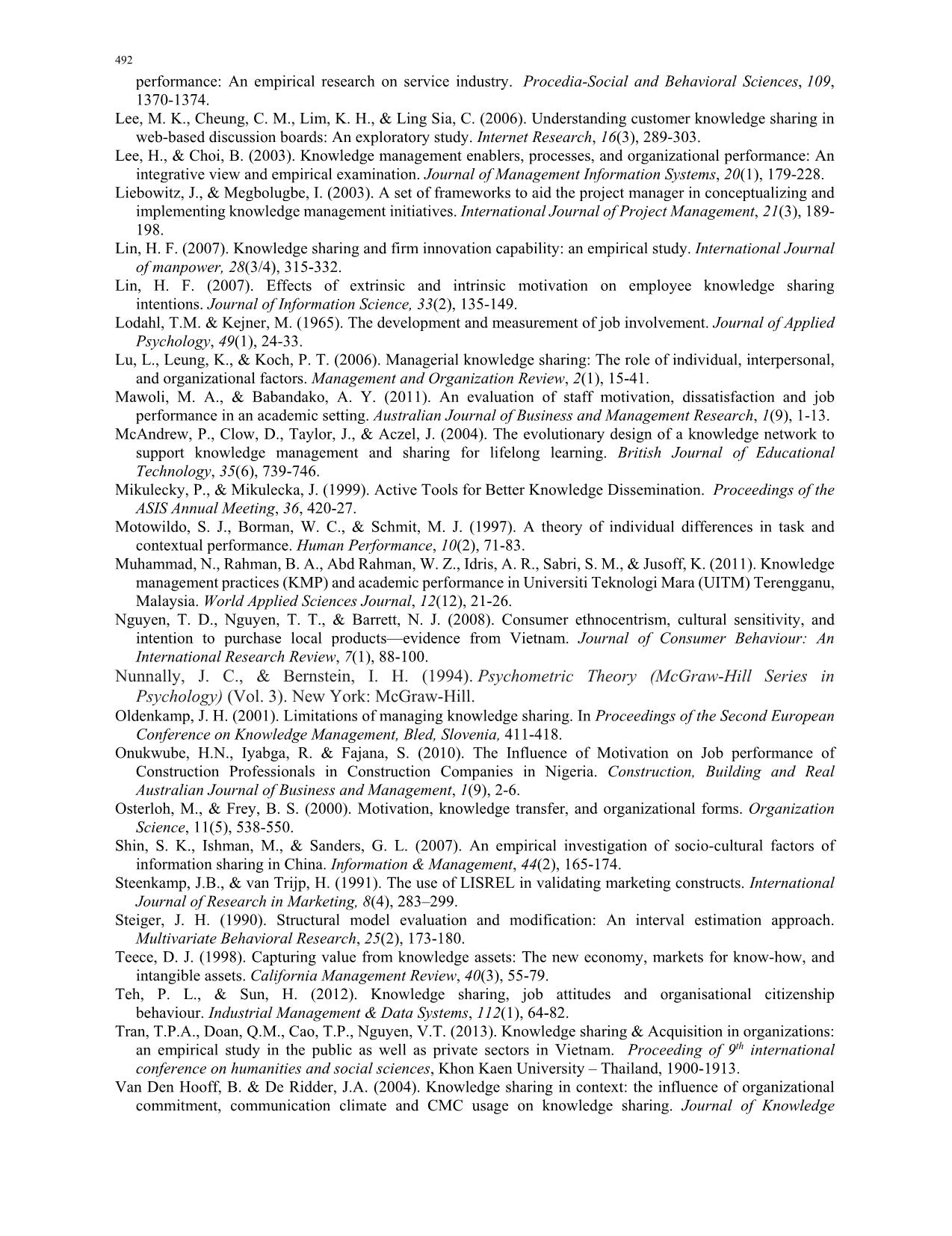
Trang 10
Tải về để xem bản đầy đủ
Tóm tắt nội dung tài liệu: Knowledge sharing and individual performance: The case of Vietnam
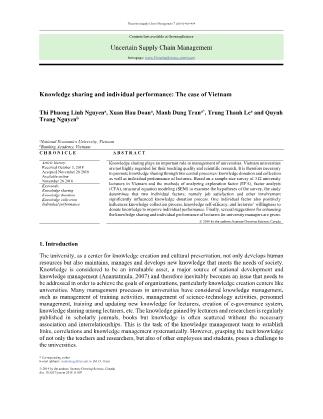
ividual with the results of other individual work and the results of the organization's work. Thirdly, each lecturer should be aware of the significance of teaching and scientific research to the training and development of each individual. Managers should spend time chatting, communicating with lecturers to listen to their aspirations and concerns regarding work. In the seminars, managers will understand the degree of attachment to the work of the lecturers and how they can be more engaged with their works, thereby enhancing knowledge sharing. Finally, managers hope lecturers perform good teaching and research work. Therefore, one of the ways to increase the performance of the lecturers’ work is to promote the act of donating knowledge. Each Vietnam universities’ pedagogical environment, also known as the academic environment, knowledge donation process is necessary and should be encouraged. References Akram, F., & Bokhari, R. (2011). The role of knowledge sharing on individual performance, considering the factor of motivation-the conceptual framework. International Journal of Multidisciplinary Sciences and Engineering, 2(9), 44-48. Al-Qadhi, Y. H., Md Nor, K., Ologbo, A. C., & Knight, M. B. (2015). Knowledge sharing in a multi-nationality workforce: Examining the factors that influence knowledge sharing among employees of diverse nationalities. Human Systems Management, 34(3), 149-165. Anantatmula, V. S. (2007). Linking KM effectiveness attributes to organizational performance. VINE: The Journal of Information and Knowledge Management Systems, 37(2), 133–149. Ardichvili, A., Page, V., & Wentling, T. (2003). Motivation and barriers to participation in virtual knowledge- sharing communities of practice. Journal of Knowledge Management, 7(1), 64-77. Bentler, P. M., & Bonett, D. G. (1980). Significance tests and goodness of fit in the analysis of covariance structures. Psychological Bulletin, 88(3), 588. Bock, G. W., Zmud, R. W., Kim, Y. G., & Lee, J. N. (2005). Behavioral intention formation in knowledge sharing: Examining the roles of extrinsic motivators, social-psychological forces, and organizational climate. MIS Quarterly, 29(1), 87-111. Bontis, N. & Serenko, A. (2007). The moderating role of human capital management practices on employee capabilities. Journal of Knowledge Management, 11(3), 31-52. Campbell, J. P. (1990). Modeling the performance prediction problem in industrial and organizational psychology. Handbook of Industrial and Organizational Psychology, 687-732. Chaudhry, A. B. (2005). Knowledge sharing practices in Asian institutions: a multi-cultural perspective from Singapore. IFLA 2005. Chiu, C. M., Hsu, M. H., & Wang, E. T. (2006). Understanding knowledge sharing in virtual communities: An integration of social capital and social cognitive theories. Decision support systems, 42(3), 1872-1888. Constant, D., Kiesler, S., & Sproull, L. (1994). What's mine is ours, or is it? A study of attitudes about information sharing. Information Systems Research, 5(4), 400-421. Davenport, T. H., & Prusak, L. (1998). Working knowledge: How organizations manage what they know. Harvard Business Press. Du, R., Ai, S., & Ren, Y. (2007). Relationship between knowledge sharing and performance: A survey in Xi’an, China. Expert systems with Applications, 32(1), 38-46. Hansen, S., & Avital, M. (2005). Share and share alike: The social and technological influences on knowledge sharing behavior. Sprouts: Working Papers on Information Environments, Systems and Organizations, 5(1), 1-19. Ho, L. A., Kuo, T. H., & Lin, B. (2012). How social identification and trust influence organizational online knowledge sharing. Internet Research, 22(1), 4-28. Islam, S., Zeisel, A., Joost, S., La Manno, G., Zajac, P., Kasper, M., & Linnarsson, S. (2014). Quantitative single- cell RNA-seq with unique molecular identifiers. Nature methods, 11(2), 163-166. Kankanhalli, A., Tan, B. C., & Wei, K. K. (2005). Contributing knowledge to electronic knowledge repositories: an empirical investigation. MIS quarterly, 29(1), 113-143. Kanungo, R. N. (1982). Measurement of job and work involvement. Journal of Applied Psychology, 67(3), 341- 349. Kuzu, Ö. H., & Özilhan, D. (2014). The effect of employee relationships and knowledge sharing on employees’ 492 performance: An empirical research on service industry. Procedia-Social and Behavioral Sciences, 109, 1370-1374. Lee, M. K., Cheung, C. M., Lim, K. H., & Ling Sia, C. (2006). Understanding customer knowledge sharing in web-based discussion boards: An exploratory study. Internet Research, 16(3), 289-303. Lee, H., & Choi, B. (2003). Knowledge management enablers, processes, and organizational performance: An integrative view and empirical examination. Journal of Management Information Systems, 20(1), 179-228. Liebowitz, J., & Megbolugbe, I. (2003). A set of frameworks to aid the project manager in conceptualizing and implementing knowledge management initiatives. International Journal of Project Management, 21(3), 189- 198. Lin, H. F. (2007). Knowledge sharing and firm innovation capability: an empirical study. International Journal of manpower, 28(3/4), 315-332. Lin, H. F. (2007). Effects of extrinsic and intrinsic motivation on employee knowledge sharing intentions. Journal of Information Science, 33(2), 135-149. Lodahl, T.M. & Kejner, M. (1965). The development and measurement of job involvement. Journal of Applied Psychology, 49(1), 24-33. Lu, L., Leung, K., & Koch, P. T. (2006). Managerial knowledge sharing: The role of individual, interpersonal, and organizational factors. Management and Organization Review, 2(1), 15-41. Mawoli, M. A., & Babandako, A. Y. (2011). An evaluation of staff motivation, dissatisfaction and job performance in an academic setting. Australian Journal of Business and Management Research, 1(9), 1-13. McAndrew, P., Clow, D., Taylor, J., & Aczel, J. (2004). The evolutionary design of a knowledge network to support knowledge management and sharing for lifelong learning. British Journal of Educational Technology, 35(6), 739-746. Mikulecky, P., & Mikulecka, J. (1999). Active Tools for Better Knowledge Dissemination. Proceedings of the ASIS Annual Meeting, 36, 420-27. Motowildo, S. J., Borman, W. C., & Schmit, M. J. (1997). A theory of individual differences in task and contextual performance. Human Performance, 10(2), 71-83. Muhammad, N., Rahman, B. A., Abd Rahman, W. Z., Idris, A. R., Sabri, S. M., & Jusoff, K. (2011). Knowledge management practices (KMP) and academic performance in Universiti Teknologi Mara (UITM) Terengganu, Malaysia. World Applied Sciences Journal, 12(12), 21-26. Nguyen, T. D., Nguyen, T. T., & Barrett, N. J. (2008). Consumer ethnocentrism, cultural sensitivity, and intention to purchase local products—evidence from Vietnam. Journal of Consumer Behaviour: An International Research Review, 7(1), 88-100. Nunnally, J. C., & Bernstein, I. H. (1994). Psychometric Theory (McGraw-Hill Series in Psychology) (Vol. 3). New York: McGraw-Hill. Oldenkamp, J. H. (2001). Limitations of managing knowledge sharing. In Proceedings of the Second European Conference on Knowledge Management, Bled, Slovenia, 411-418. Onukwube, H.N., Iyabga, R. & Fajana, S. (2010). The Influence of Motivation on Job performance of Construction Professionals in Construction Companies in Nigeria. Construction, Building and Real Australian Journal of Business and Management, 1(9), 2-6. Osterloh, M., & Frey, B. S. (2000). Motivation, knowledge transfer, and organizational forms. Organization Science, 11(5), 538-550. Shin, S. K., Ishman, M., & Sanders, G. L. (2007). An empirical investigation of socio-cultural factors of information sharing in China. Information & Management, 44(2), 165-174. Steenkamp, J.B., & van Trijp, H. (1991). The use of LISREL in validating marketing constructs. International Journal of Research in Marketing, 8(4), 283–299. Steiger, J. H. (1990). Structural model evaluation and modification: An interval estimation approach. Multivariate Behavioral Research, 25(2), 173-180. Teece, D. J. (1998). Capturing value from knowledge assets: The new economy, markets for know-how, and intangible assets. California Management Review, 40(3), 55-79. Teh, P. L., & Sun, H. (2012). Knowledge sharing, job attitudes and organisational citizenship behaviour. Industrial Management & Data Systems, 112(1), 64-82. Tran, T.P.A., Doan, Q.M., Cao, T.P., Nguyen, V.T. (2013). Knowledge sharing & Acquisition in organizations: an empirical study in the public as well as private sectors in Vietnam. Proceeding of 9th international conference on humanities and social sciences, Khon Kaen University – Thailand, 1900-1913. Van Den Hooff, B. & De Ridder, J.A. (2004). Knowledge sharing in context: the influence of organizational commitment, communication climate and CMC usage on knowledge sharing. Journal of Knowledge T. P. L. Nguyen et al. / Uncertain Supply Chain Management 7 (2019) 493 Management, 8(6), 117-30. Van den Hooff, B., & de Leeuw van Weenen, F. (2004). Committed to share: commitment and CMC use as antecedents of knowledge sharing. Knowledge and Process Management, 11(1), 13-24. Von Krogh, G., Ichijo, K., & Nonaka, I. (2000). Enabling knowledge creation: How to unlock the mystery of tacit knowledge and release the power of innovation. Oxford university press. Wasko, M. M., & Faraj, S. (2005). Why should I share? Examining social capital and knowledge contribution in electronic networks of practice. MIS Quarterly, 29(1), 35-57. Weggeman, M. (2000). Kennismanagement: de Praktijk [Knowledge Management: Practice]. Schiedam: Scriptum Management. Zakaria, N., Amelinckx, A., & Wilemon, D. (2004). Working together apart? Building a knowledge‐sharing culture for global virtual teams. Creativity and Innovation Management, 13(1), 15-29. Zhao, H., & Luo, Y. (2005). Antecedents of knowledge sharing with peer subsidiaries in other countries: A perspective from subsidiary managers in a foreign emerging market. MIR: Management International Review, 45(1), 71-97. Appendix 1 Sym Items Factors bol En1 I enjoy sharing my knowledge with colleagues Enjoyment in En2 I enjoy helping colleagues by sharing my knowledge helping others En3 It feels good to help someone by sharing my knowledge (En) En4 Sharing my knowledge with colleagues is pleasurable Se1 My knowledge sharing would help other numbers in the organization to solve their problems Se2 My knowledge sharing would create new business opportunities for the organization Knowledge self- Se3 My knowledge sharing would improve work process in the organization efficacy (Se) Se4 My knowledge sharing would increase productively in the organization Se5 My knowledge sharing would help the organization achieve its performance objectives In1 The most important things that happen to me involve my present job In2 Most of my interests are centered around my job Job involvement In3 I have very strong ties with my present job which would be very difficult to break (In) In4 I like to be absorbed in my job most of the time In5 The most important things that happen in life involve work Ma1 My manager always set a good example in sharing his knowledge with others Management Ma2 My manager supports me in sharing knowledge with colleagues in other departments support Ma3 My manager allows me to share my knowledge with my colleagues even though it may influence the present job process (Ma) Ma4 My manager instructs us on how to share our personal knowledge within the department Ma5 My manager does not care about my knowledge and does not encourage me to share my knowledge with other colleagues Re1 Sharing my knowledge with colleagues should be rewarded with a higher salary Re2 Sharing my knowledge with colleagues should be rewarded with a higher bonus Rewards (Re) Re3 Sharing my knowledge with colleagues should be rewarded with a promotion Re4 Sharing my knowledge with colleagues should be rewarded with an increased job security Information and Te1 Work related information and knowledge are stored, classified and updated in a scientific and regular manner communication Te2 The organization’s IT system provides valuable and useful information/data for my work technology (Te) Te3 The organization’s IT system facilitates the sharing of knowledge and information among members Do1 When I learn something new, I tell my colleagues about it Knowledge Do2 I share the knowledge I have, with my colleagues donation Do3 I think it is important that my colleagues know what I am doing (Do) Do4 I regularly tell my colleagues what I am doing Co1 When I need certain knowledge, I ask my colleagues about it Knowledge Co2 I like to be informed of what my colleagues know collection (Co) Co3 I ask my colleagues about their abilities when I need to learn something Co4 When one of my colleagues is good at something I ask him/her to teach me how to do that thing Pe1 I completed more work than the expectations of the manager Pe2 I can finish all the work earlier than the assigned plan Pe3 I can reduce the time required to complete my daily work Pe4 The results of my work always exceed the work goals assigned by managers Individual Pe5 I have ideas and useful suggestions for the university performance (Pe) Pe6 I always meet the wishes of learners Pe7 I have never had any delays in my work or caused anything to do with my carelessness Pe8 I have never received any complaints about poor performance Pe9 The manager is always satisfied with my results 494 Appendix 2 Factor Item Factor loading Cronbach’s Alpha En1 0.870 En2 0.871 Enjoyment in helping others 0.884 En3 0.762 En4 0.799 Se3 0.702 Knowledge self-efficacy Se4 0.702 0.860 Se5 0.925 In2 0.810 Job involvement In4 0.709 0.707 In5 0.597 Ma1 0.862 Ma2 0.862 Management support Ma3 0.589 0.846 Ma4 0.817 Ma5 0.654 Re1 0.910 Re2 0.897 Rewards 0.907 Re3 0.854 Re4 0.738 Te1 0.650 Information and communication technology Te2 0.792 0.799 Te3 0,791 Do1 0.571 Do2 0.531 Knowledge donation 0.779 Do3 0.638 Do4 0.674 Co1 0.701 Co2 0.712 Knowledge collection 0.766 Co3 0.745 Co4 0.698 Pe1 0.611 Pe2 0.607 Pe3 0.631 Pe4 0.666 Individual performance 0.801 Pe6 0.574 Pe7 0.808 Pe8 0.853 Pe9 0.793 © 2019 by the authors; licensee Growing Science, Canada. This is an open access article distributed under the terms and conditions of the Creative Commons Attribution (CC-BY) license (
File đính kèm:
 knowledge_sharing_and_individual_performance_the_case_of_vie.pdf
knowledge_sharing_and_individual_performance_the_case_of_vie.pdf

